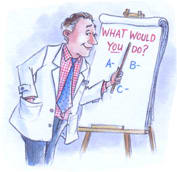Dispensing Frontiers
Paradigms and Professionalism
Do you and your staff agree on what "professional" means?

BY LEONA MEDITZ
Close your eyes and picture a man with a beard. Who do you see? Santa Claus? Abraham Lincoln? Osama bin Ladin? Such a difference!
Now picture an optical professional.
The point? Your ideas about what makes someone an optical "professional" may be very different from the ideas held by your optical team. If that's the case, your team may respond to patients very differently than you want them to.
DEFINING PROFESSIONALISM
How can you uncover and resolve differences in your paradigms about professionalism? Don't ask your staff to define professionalism; if they use adjectives like "trust," "quality" and "service," you still won't know whether your interpretation of those words matches theirs. Instead, ask them how a professional would act in sticky situations. For example:
How does a professional view money? How should a professional:
- collect fees?
- react when a patient says he "can't afford" to purchase something?
- answer when the patient says the doctor down the street charges less?
Is it professional to even talk about money? If so, when?
How does a professional add value to the time spent with the patient? For example:
- Is it professional to answer the telephone while helping a patient?
- How does a professional explain to the patient why it takes more than an hour to produce glasses? What does he do if the lab is late with the order?
- Does a professional help patients on a first-come, first-served basis? Under what circumstances should you help one patient before another?
- In which situations is it appropriate to schedule optical appointments?
- Is it fair to your compliant patients if you respond first to patients who complain the loudest?
- How much "chit chat" with the patient is professional?
- Is fast service bad service?
How does a professional define "quality of care?" Ask your staff:
- What does a professional do to determine what's best for each patient?
- What could a patient ask for that would be unprofessional to deliver?
- Are you providing good care if you only offer the patient one pair of glasses?
- Is it unprofessional to offer the patient "extras"? If so, when?
- What if the patient won't accept the care you think he needs?
|

|
|
|
ILLUSTRATION: AMY WUMMER |
|
PENETRATING PARADIGMS
As you discover differences between your team's paradigms and yours, use the "T.H.I.N.K." system to respond:
Trust. Your staff may only be willing to consider new ideas if they trust you. So, create a safe environment. Then, if a staff member assumes you're mean or uncaring because your ideas about these issues are different, don't argue about it. Instead, work on your relationship with that person.
Help. Help others see your side by listening to their reasons for disagreeing. Then ask them how they came to their conclusions. (Most paradigms form because of specific experiences.)
Intelligence. Use "what if" scenarios to present your position. Respond to differences with reason, not emotion.
No judgement. Avoid labeling staff members as "good" or "bad" because they disagree with your ideas.
Know when to back down. You never know -- you may be the one who needs to change your paradigm!
RESOLVING DIFFERENCES
One thing is certain: A professional is always willing to learn, and questioning your existing beliefs is a key part of learning. So, sit down with your staff and have an open discussion about professionalism. You should be able to uncover differences and go a long way toward resolving them.
Leona Meditz has 25 years experience opening, owning and operating optical dispensaries. To learn how to train your people or manage products, visit her Web site at www.3ps4profit.com or e-mail Leona@3ps4profit.com.








